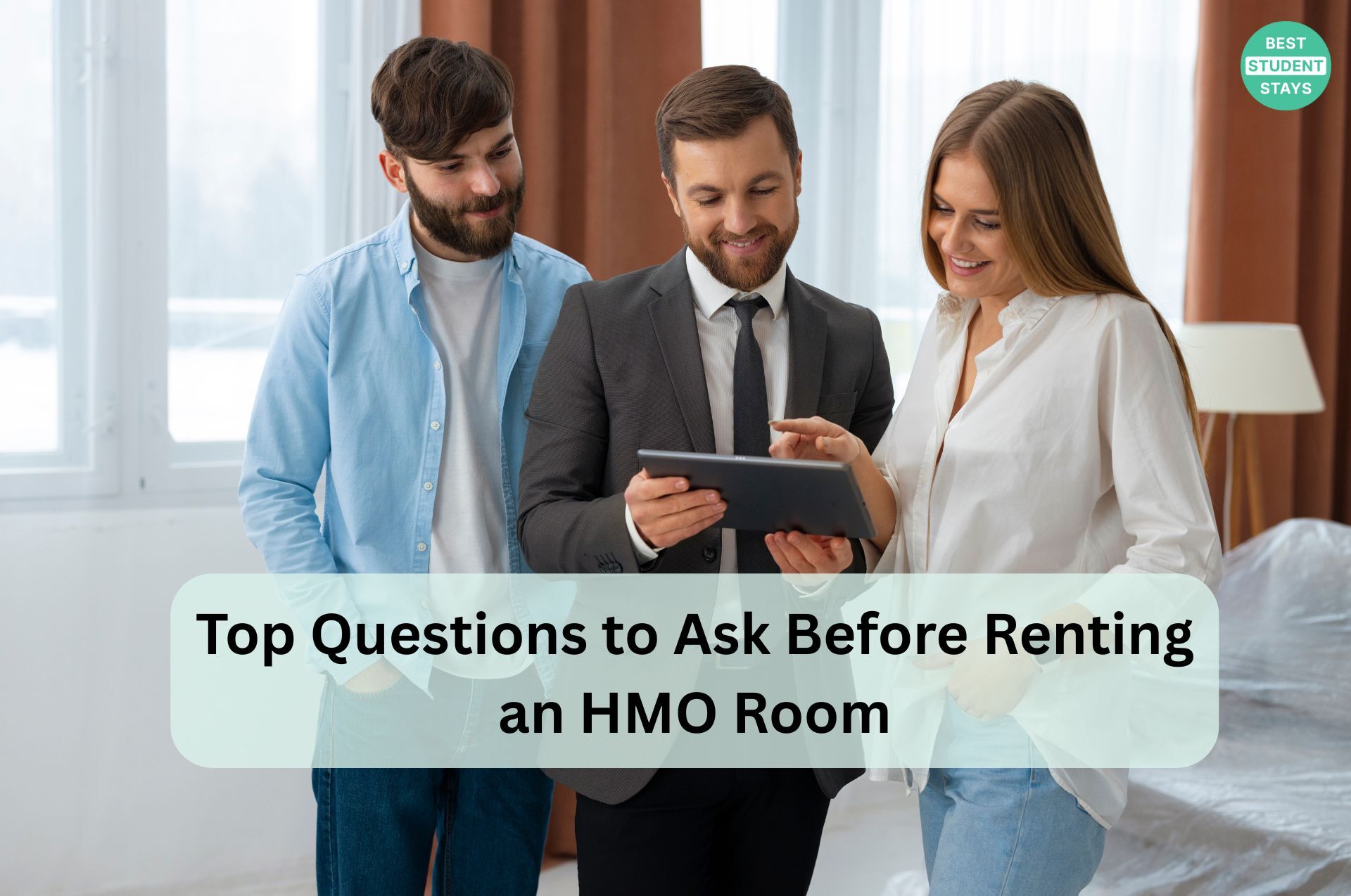Quick Answer: What Is an HMO?
A HMO (House in Multiple Occupation) is a property where at least three people from different households share facilities like kitchens, bathrooms, or toilets. It's perfect for students who want affordable accommodation while building friendships with housemates.
Key Facts:
-
Minimum 3 tenants from different households
-
Shared facilities (kitchen, bathroom, or toilet)
-
Often cheaper than solo renting
-
Special legal protections for tenants
-
Popular with students and young professionals
Types of HMOs: Understanding Your Options
Standard Shared Houses
The most common type of student HMO, where each person has their own bedroom but shares communal spaces. For example, five students each rent a bedroom in a house, sharing one kitchen and two bathrooms.
Bedsit-Style HMOs
This type of HMO housing has individual rooms with basic facilities and shared communal areas. For example, a converted Victorian house with six bedsits, each with a sink, and a communal kitchen and bathrooms.
Purpose-Built Student Accommodation
This is the most popular option for student housing in the UK. Purpose-built student accommodation are modern buildings designed specifically for students. There are many shared accommodation options available at unbelievably affordable prices. For example, students can book new-build blocks with en-suite rooms and shared kitchens for 6-8 tenants per flat.
|
HMO Type |
Privacy Level |
Cost Range |
Best For |
|
Standard Shared House |
Medium |
£300-600/month |
Students, young professionals |
|
Bedsit-Style |
High |
£400-700/month |
Those wanting more privacy |
|
Purpose Built |
Medium-High |
£500-900/month |
Students prioritising modern facilities |
Who Should Consider HMO Living?
Perfect For:
-
Students looking for affordable accommodation near campus
-
Young professionals wanting to save money while networking
-
People new to a city seeking ready-made social connections
-
Anyone on a budget who doesn't mind sharing facilities
Maybe Not Right If:
-
You value complete privacy above all else
-
You have specific dietary requirements needing exclusive kitchen use
-
You're sensitive to noise from multiple households
-
You prefer controlling all household decisions independently
HMO vs Other Accommodation: Making the Right Choice
|
Factor |
HMO |
Studio Flat |
Private Rental |
University Halls |
|
Monthly Cost |
£300-600 |
£600-1200 |
£800-1500 |
£400-800 |
|
Bills Included |
Often ✓ |
Usually ✗ |
Usually ✗ |
Usually ✓ |
|
Social Opportunities |
High |
Low |
Low |
High |
|
Privacy |
Medium |
High |
High |
Low |
|
Flexibility |
Medium |
High |
Low |
Low |
|
Deposit |
1-6 Weeks |
4-6 weeks |
4-6 weeks |
Usually none |
The True Cost of HMO Living: Complete Budget Breakdown Monthly Expenses
|
Expense Category |
Typical Range |
What's Included |
|
Rent |
£300-600 |
Room + shared facilities |
|
Bills |
£0-80 |
Gas, electricity, water, internet |
|
Council Tax |
£0* |
*Often covered by HMO landlord |
|
Contents Insurance |
£5-15 |
Protect your belongings |
|
**Total Monthly |
£305-695 |
Full living costs |
Upfront Costs
-
Deposit: 1-6 weeks' rent
-
First month's rent: £300-600
-
Admin fees: £50-200 (where applicable)
-
Total upfront: £650-1400
Money-Saving Tips
1. Look for all-bills-included deals to avoid bill shock
2. Share household items like cleaning supplies with housemates
3. Buy contents insurance as a group for better rates
4. Choose HMOs with existing furniture to avoid buying everything
Finding Your Perfect HMO: Step-by-Step Guide
1. Research Areas
-
Check transport links to your university or workplace
-
Review local amenities (shops, restaurants, healthcare)
-
Assess safety levels using police crime mapping tools
-
Consider noise levels (main roads, nightlife areas)
2. Use Reliable Platforms
-
Student accommodation websites like Best Student Stays
-
Property portals
-
University accommodation services
-
Social media housing groups
3. Questions to Ask Landlords
Essential Questions:
-
Is the property properly licensed?
-
What's included in the rent?
-
How are bills divided?
-
What's the deposit and when is it returned?
-
Are there any house rules?
Safety Questions:
-
When were gas and electrical safety checks last done?
-
Are smoke alarms fitted in every room?
-
Is there adequate fire safety equipment?
-
Are all doors and windows secure?
4. Red Flags to Avoid
❌ No written tenancy agreement
❌ Pressure to pay cash only
❌ Reluctance to show safety certificates
❌ No deposit protection scheme mentioned
❌ Overcrowded conditions
❌ Poor maintenance standards
HMO Tenant Rights to Keep in Mind
Legal Protections
-
Written Tenancy Agreement: HMO regulations state that landlords must provide written agreements for shared accommodation with 4+ people.
-
Deposit Protection: Your deposit must be protected in a government-approved scheme within 30 days.
Minimum Room Sizes:
-
Single occupancy: 6.51 square metres minimum
-
Couple: 10.22 square metres minimum
-
Local councils may set higher standards
Landlord Responsibilities
|
Area |
Landlord Must Provide |
|
Safety |
Annual gas checks, electrical inspections, fire alarms |
|
Maintenance |
Structural repairs, heating, plumbing, pest control |
|
Facilities |
Adequate bathrooms, kitchens, heating for occupancy levels |
|
Licensing |
Valid HMO licence where required |
When Landlords Need HMO Licences
Mandatory Licensing:
Properties with 5+ people from 2+ households Additional Licensing: Some councils require licences for smaller HMOs Selective Licensing: May apply in specific areas
Your Protection: If your landlord should have a HMO licence but doesn't:
-
They may be unable to evict you
-
You could claim back rent paid
-
The council can prosecute them
Safety Standards: What to Expect
Fire Safety Requirements
Every HMO Must Have:
-
Smoke alarms in every room and communal area
-
Fire doors where required (buildings 3+ storeys)
-
Clear escape routes marked and unobstructed
-
Fire blankets in kitchens
-
Emergency lighting in communal areas (larger HMOs)
Security Standards
-
Secure locks on all external doors and windows
-
Individual bedroom locks
-
Adequate lighting in communal areas
-
Window locks on ground floor and accessible windows
Maintenance Standards
-
Regular gas safety checks (annually)
-
Electrical inspections (every 5 years)
-
Adequate heating in all rooms
-
Proper ventilation to prevent damp and mould
What to Do If Standards Aren't Met:
1. Document issues with photos and written records
2. Report to landlord in writing first
3. Contact local council environmental health team
4. Keep records of all communications
Living in a HMO: Rules and Etiquette
Common House Rules
Noise and Respect
-
Quiet hours typically 10pm-8am on weekdays
-
Respect others' space and belongings
-
Clean up after yourself immediately
Cleaning Responsibilities
-
Weekly cleaning rotas for communal areas
-
Keep personal items in your own room
-
Take turns with household tasks
Guest Policies
-
Usually overnight guests allowed 2-3 nights per week
-
Always inform housemates in advance
-
Guests must respect house rules
Creating Harmony
Communication Tips:
-
Set up a house WhatsApp group
-
Hold monthly house meetings
-
Address issues quickly before they escalate
Practical Solutions:
-
Create a chore rota that everyone agrees to
-
Set up communal fund for shared items
-
Establish clear fridge and freezer space allocations
Common Problems and Solutions
Issue: High Tenant Turnover
Problem: Constantly getting new housemates disrupts house dynamics.
Solutions:
-
Choose HMOs with longer average tenancy lengths
-
Look for student-specific properties where turnover aligns with academic years
-
Build good relationships to encourage staying
Issue: Bill Disputes
Problem: Arguments over utility usage and splitting costs.
Solutions:
-
Choose all-bills-included properties where possible
-
Set up direct debits from a shared house account
-
Monitor usage collectively using smart meters
Issue: Maintenance Delays
Problem: Landlord slow to fix important issues.
Solutions:
-
Always report problems in writing (email/text)
-
Know your local council's environmental health contact
-
Join a tenants' union for support and advice
Issue: Noise Complaints
Problem: Conflicts between housemates or neighbour complaints.
Solutions:
-
Establish house rules early and stick to them
-
Use mediation services if conflicts arise
-
Consider noise-reducing measures like carpets and soft furnishings
Getting Help: Support and Complaints
When Things Go Wrong
Housing Issues:
-
Shelter helpline: 0808 800 4444
-
Local council environmental health
-
Citizens Advice Bureau
Deposit Disputes:
-
Deposit protection scheme adjudication
-
Small claims court for unprotected deposits
Tenancy Problems:
-
University accommodation services
-
Local tenant unions
-
Legal aid for serious issues
Useful Resources
|
Organisation |
Contact |
What They Help With |
|
Shelter |
0808 800 4444 |
Housing rights and homelessness |
|
Citizens Advice |
citizensadvice.org.uk |
General advice and legal guidance |
|
ACORN |
acorntheunion.org.uk |
Tenant union support |
|
Deposit Protection Schemes |
Various websites |
Deposit disputes |
Making Your HMO Decision
HMO living offers an excellent way to save money while building friendships and gaining independence. HMOs are the perfect choice for individuals looking for UK student accommodation or affordable housing. The key to success lies in choosing the right property, understanding your rights, and maintaining good relationships with housemates.
Before You Commit:
✅ Visit the property and meet potential housemates
✅ Read all documentation carefully
✅ Verify landlord credentials and licensing
✅ Understand all costs involved
✅ Know your rights and responsibilities
Remember: A good HMO experience depends on preparation, communication, and choosing reputable landlords who maintain proper standards.
Ready to find your perfect HMO? Start your search with trusted platforms that prioritise student safety and satisfaction. Your ideal shared living experience is waiting to be discovered.
Looking for quality HMO accommodation? Visit Best Student Stays to browse verified properties with proper licensing, safety standards, and student-friendly landlords across the UK.



